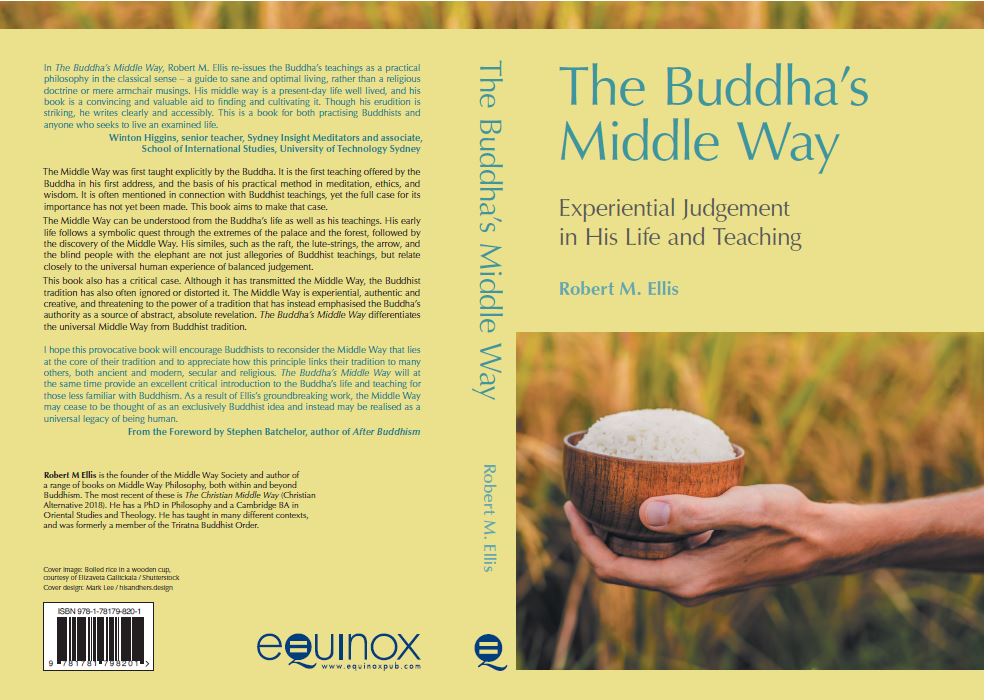The Buddha’s Middle Way: Experiential Judgement in his Life and Teaching
by Robert M. Ellis, with a foreword by Stephen Batchelor. Published by Equinox, 2019.
The Middle Way was first taught explicitly by the Buddha. It is the first teaching offered by the Buddha in his first address, and the basis of his practical method in meditation, ethics, and wisdom. It is often mentioned in connection with Buddhist teachings, yet the full case for its importance has not yet been made. This book aims to make that case.
The Middle Way can be understood from the Buddha’s life as well as his teachings. His early life follows a symbolic quest through the extremes of the Palace and the Forest, followed by the discovery of the Middle Way. His similes, such as the raft, the lute-strings, the arrow, and the blind people with the elephant are not just allegories of Buddhist teachings, but relate closely to the universal human experience of balanced judgement.
This book also has a critical case. Although it has transmitted the Middle Way, the Buddhist tradition has also often ignored or distorted it. The Middle Way is experiential, authentic and creative, and thus threatening to the power of a tradition that has instead emphasised the Buddha’s authority as a source of abstract, absolute revelation. The Buddha’s Middle Way aims to differentiate the universal Middle Way from Buddhist tradition.
Available in hardback, paperback and ebook: go to publisher’s page
Reviews
I hope this provocative book will encourage Buddhists to reconsider the Middle Way that lies at the core of their tradition and to appreciate how this principle links their tradition to many others, both ancient and modern, secular and religious. The Buddha’s Middle Way will at the same time provide an excellent critical introduction to the Buddha’s life and teaching for those less familiar with Buddhism. As a result of Ellis’s groundbreaking work, the Middle Way may cease to be thought of as an exclusively Buddhist idea but a universal legacy of being human.
From the Foreword by Stephen Batchelor, author of ‘After Buddhism’
In The Buddha’s Middle Way, Robert M. Ellis re-issues the Buddha’s teachings as a practical philosophy in the classical sense – a guide to sane and optimal living, rather than a religious doctrine or mere armchair musings. His middle way is a present-day life well lived, and his book is a convincing and valuable aid to finding and cultivating it. Though his erudition is striking, he writes clearly and accessibly. This is a book for both practising Buddhists and anyone who seeks to live an examined life.
Winton Higgins, senior teacher, Sydney Insight Meditators and associate, School of International Studies, University of Technology Sydney
Contents
Foreword by Stephen Batchelor
Introduction
1. The Middle Way in the Buddha’s early life
a. The Story of Siddhartha Gautama
b. The Palace
c. The Four Sights and Going Forth
d. The Forest: Spiritual Teachers
e. The Forest: Asceticism
f. Discovery of the Middle Way
g. The Assaults of Mara
h. Awakening: Meaning versus Belief
2. The Middle Way in the Buddha’s ministry
a. The Decision to Teach
b. The First Address and Four Tasks
c. The Buddha’s educative approach
d. The Buddha’s discourses
e. The Buddha’s Politics
f. The Buddha’s Death
3. The Buddha’s Metaphors
a. Beyond Allegory
b. The Middle Way as Metaphor
c. Provisionality: The Raft and the Lute Strings
d. Absolutisation: The Arrows
e. Incrementality: The Ocean
f. Agnosticism: The Elephant and the Snake
g. Integration: The Wet Piece of Wood
4. Issues in the Buddhist Interpretation of the Middle Way
a. The Misunderstanding of Scepticism
b. The Ontological Obsession
c. The Range of Absolutes
d. The Clustering of Absolutes: ‘Eternalism’ and ‘Nihilism’
e. Even-handedness and the Preference for Eternalism
5. Interpreting the Eightfold Path
a. The Eightfold Path and Integration
b. The Middle Way in Meditation
c. The Middle Way in Ethical Practice
d. The Middle Way of Wisdom
6. Interpreting Buddhist Teachings
a. Conditionality
b. The Three Marks of Conditioned Existence
c. Craving and Absolutisation
d. Karma and Rebirth
e. The Buddha’s Authority and Status
f. The Meaning of ‘Dharma’
g. The Community and Monastic Tradition
h. Faith and Going for Refuge
7. Alternative Sources of the Middle Way
a. The Blind People and the Elephant Again
b. Pyrrhonian Scepticism
c. Christian Incarnation
d. Jungian Individuation
e. Scientific Falsificationism
f. Systems Theory and Biology
g. Embodied Meaning
h. Brain Lateralisation and Absolutisation
i. Cognitive Bias and Absolutisation
j. Ellen Langer’s ‘Mindfulness’
k. The Authentic Individual
Conclusion
Bibliography
Read the foreword and introduction
Listen to a podcast interview about the book

